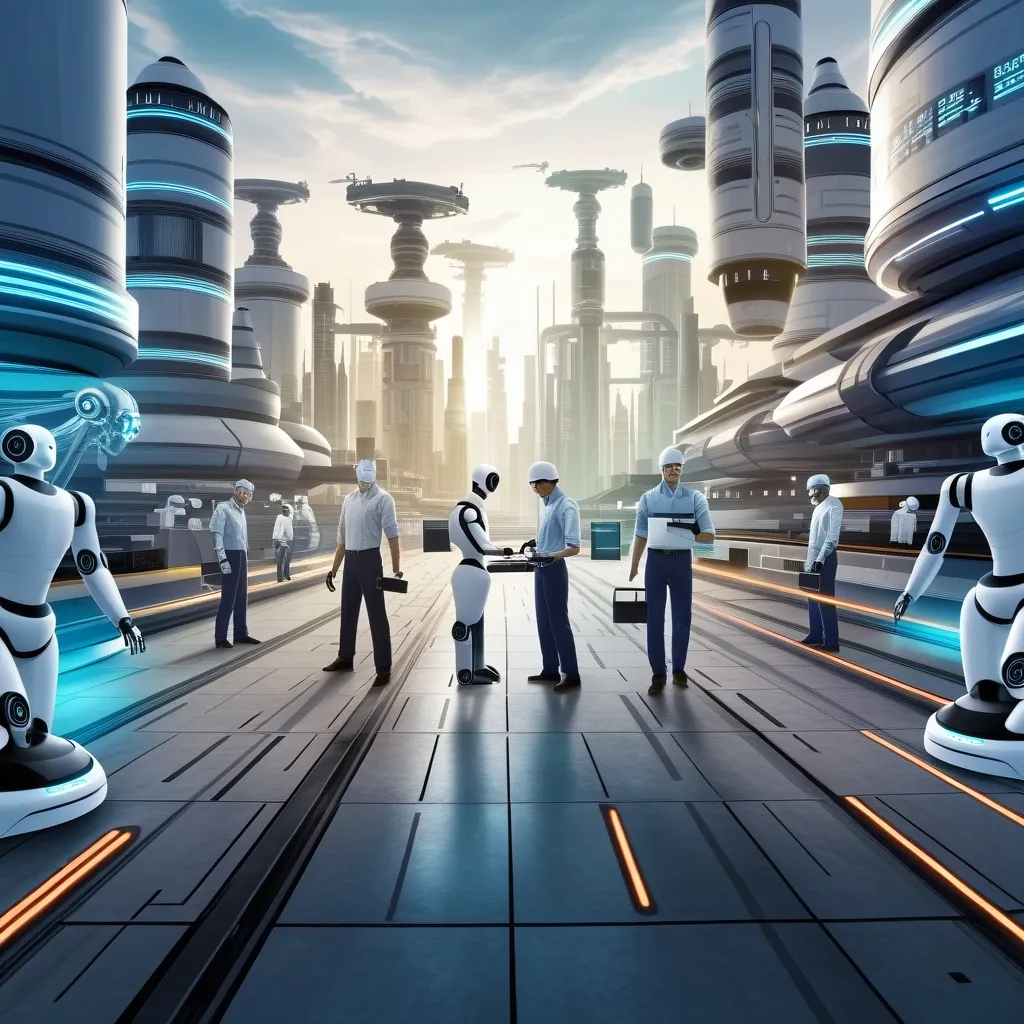The Future of Work: Navigating the Automation Revolution
The world of work is changing fast, and automation is leading the charge. It’s like we’re on the brink of a new industrial revolution, but instead of steam engines, we’ve got AI and robots. Pretty wild, right? By 2030, we could see up to 30% of jobs become automated. That’s not just a small change - it’s a seismic shift in how we work and live.
Think about it: AI could replace the equivalent of 300 million full-time jobs globally. That’s a quarter of all work tasks in the US and Europe. It’s enough to make anyone sit up and take notice.
So, which jobs are on the chopping block? Well, if you’re a customer service rep, you might want to start polishing your resume. Those AI-powered chatbots are getting smarter by the day, and they don’t need coffee breaks or sick days. Receptionists are in the same boat. Who needs a human to answer calls when a robot can do it 24/7?
Even fast food cooks aren’t safe. Imagine walking into your favorite burger joint and seeing a robot flipping patties. It’s not science fiction anymore - it’s happening right now. And it’s not just blue-collar jobs at risk. White-collar workers, watch out! Those back-office jobs in clinics and law firms? They’re prime targets for automation.
But here’s the kicker: it’s not all doom and gloom. Sure, automation might displace some jobs, but it’s also creating new ones. By 2025, we might lose 85 million jobs to automation, but gain 97 million new roles. That’s a net positive, folks!
These new jobs aren’t just replacements - they’re whole new fields. We’re talking agriculture tech, digital platforms, e-commerce, AI development. The future is full of jobs we can’t even imagine yet. It’s like trying to explain “social media manager” to someone in 1990.
Now, let’s talk money. Automation could boost global GDP by 7% and kick productivity growth up by 1.5 percentage points over the next decade. That’s huge! But (and it’s a big but) it could also lead to some serious income inequality. We’re looking at a potential scenario where a lot of workers get pushed into lower-paying service jobs, or worse, permanent unemployment.
This isn’t just an economic issue - it’s a social one. Nobody wants to see a permanent, unemployable underclass. That’s the stuff revolutions are made of. So, what do we do about it?
Education is key. We need to overhaul our educational system to prepare workers for the jobs of the future. We’re not talking about churning out more coders (though that wouldn’t hurt). We need to focus on skills that are hard to automate - creativity, critical thinking, emotional intelligence. You know, the stuff that makes us human.
And it’s not just about formal education. Companies and governments need to step up with retraining programs. If your job gets automated, you shouldn’t be left high and dry. There should be a path to transition into new roles. Maybe today’s taxi driver becomes tomorrow’s autonomous vehicle technician.
But let’s be real - this transition isn’t going to be easy. It’s going to take time, effort, and a whole lot of adaptability. We’re going to see some growing pains as we figure out how to balance automation with human work.
The goal isn’t to replace humans entirely. It’s about finding that sweet spot where automation enhances our work rather than replacing it. Think about healthcare. AI can help diagnose diseases with incredible accuracy, but we still need human doctors to interpret results and provide care. A computer might be able to spot a tumor on an X-ray, but it can’t hold a patient’s hand and explain what that means.
Or take education. AI can personalize learning experiences in ways we never thought possible. But it can’t replace a teacher who notices a student is struggling and offers encouragement. We’re not aiming for a world of robot overlords - we’re aiming for a world where humans and machines work together in harmony.
E-commerce is a great example of this balance in action. Sure, automation has changed how we shop online, but it’s also created a ton of new jobs in logistics, digital marketing, and customer service. And with the rise of remote work, we’re seeing opportunities for freelancers and remote workers that simply didn’t exist before.
As we barrel towards this automated future, it’s natural to feel a bit anxious. Change is always scary, especially when it affects how we make a living. But here’s the thing: humans are incredibly adaptable. We’ve weathered industrial revolutions before, and we’ll weather this one too.
The key is to stay informed and proactive. Keep an eye on the trends in your industry. Are there aspects of your job that could be automated? If so, start thinking about how you can upskill or reskill. Maybe take an online course in a related field, or learn a new skill that complements your current role.
And remember, automation isn’t just about efficiency - it’s about freeing us up to do more meaningful work. Imagine a world where mundane tasks are handled by machines, leaving us free to focus on creativity, innovation, and problem-solving. That’s the real promise of automation.
As we wrap this up, let’s remember that the future of work isn’t set in stone. We have the power to shape it. By investing in education, embracing lifelong learning, and working to create policies that ensure the benefits of automation are shared by all, we can create a future where technology enhances our work rather than replaces it.
The road ahead might be bumpy, but it’s also full of possibilities. So buckle up, stay curious, and get ready for the ride of a lifetime. The future of work is coming, and it’s going to be one heck of an adventure.






